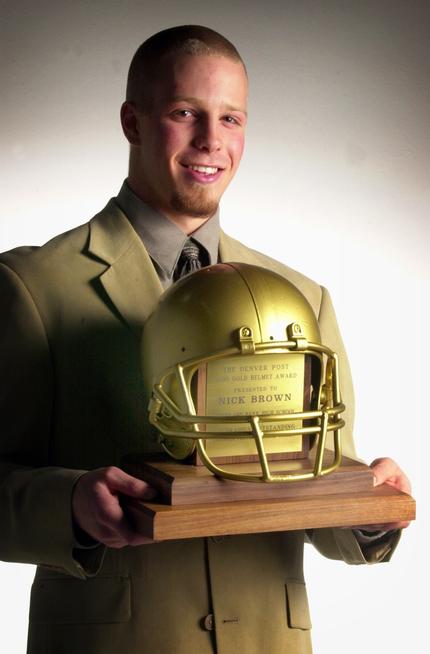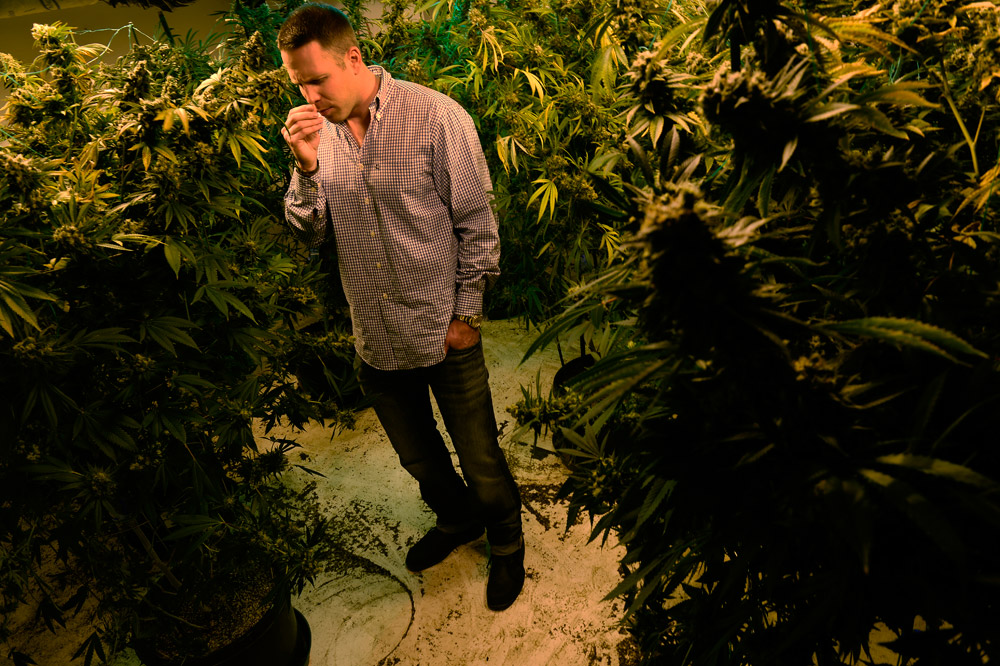SILVERTHORNE — Nick Brown hates marijuana, as in the reference, not the plant. It’s a slang term, he insists, and doesn’t accurately depict his beloved cannabis.
The 32-year-old has had unwavering faith in it since he was a youth and only within the past historic year in Colorado has he been able to be open about it.
“I knew I believed in it,” Brown said. “I’ve consumed cannabis the majority of my life, since the sixth grade. I’ve never done a hard drug in my entire life, but I’m not hating on them.
“I’ve used it for sleep and to wind down, so I don’t get stressed out. I’ve got great faith, a great family, but I’ve always believed in cannabis … but it was illegal.”
It was illegal to purchase without a doctor’s recommendation and medical marijuana card until Jan. 1, 2014, which was probably as interesting a day as Brown has had. The Denver Post’s 2000 Gold Helmet Award winner at Woodland Park High School as the state’s top senior football player, scholar and citizen had dabbled in dispensing medicinal cannabis since 2009, but on that day he got the go-ahead to control a large swath of Colorado’s groundbreaking legal cannabis distribution.
Brown runs High Country Healing and owns all or parts of seven cannabis stores in Silverthorne, Alma and Colorado Springs, as well as some warehouses where cannabis is grown.
“He is the guy that you want running a cannabis business,” said Joe Lindsay, HCH’s head budtender and director of customer relations. “His heart is into it. And he’s going for healing people; the money is a sideline. He’s here to heal people and help us heal people.
“When you come in and see a lady drop her pill case on the counter and say ‘because of cannabis, I don’t have to take these daily and I feel like myself’ … you get chills hearing these people’s stories every day. You’re changing these people’s lives.”
Map: Colorado recreational marijuana shops and medical dispensaries

Brown operates primarily out of a Silverthorne office that sits inconspicuously on the second floor of a corner-store group of buildings off Interstate 70 and Exit 205. It wasn’t a career choice the Ivy League graduate planned to make coming out of college.
“If there’s anything about Nick, it’s that he follows his passions and his loves, and does them to the best of his ability,” said George Holley, Brown’s friend and former Woodland Park teammate who’s now a deputy district attorney on the Western Slope.
Said Brown’s father, Allen: “He could have saved me a half million (dollars) at Princeton if he would told me … but I’m all for it.”
Business worth millions
For Nick Brown, having the keys to dispense cannabis isn’t simply about getting stoned. It’s more about providing pain relief and fully exploring the business aspects of an exploding industry.
“He was walking on eggshells, and we come from a small town,” Allen Brown said. “No one wanted to take the chance. But my son did.”
After graduating in 2005 from Princeton, where he was a four-year starter as a free safety, Nick Brown joined his father in the mortgage-lending business. He got in during boom times that lasted two more years. Then the recession hit.
“We lost almost everything,” Allen Brown said.
The Browns battled to stay financially afloat and Nick moved to Breckenridge, where he tried his hand in real estate while still invested in his father’s lending company. He also attended a meeting about medical marijuana.
“I found out that you can make a business of being a caregiver out of a storefront,” he said.
Big money: Paypal co-founder’s $2B firm investing in marijuana
Brown wasn’t sure where it would take him, but when Colorado voters in November 2012 approved Amendment 64, legalizing recreational marijuana use, his mind raced.
“I need to get in before someone else does,” he kept telling himself, and he put in the first application in Silverthorne. Using what he said was his last $51,000, he “came out swinging” on New Year’s Day in 2014. One year and several expansions later, his business is worth about $4 million, he said, “and it’s debt free.”
He has gone from nine employees to 33 at the main Silverthorne store. He no longer has to grow plants in assorted houses. Now he uses warehouses, in addition to growing rooms at store sites.
“You sure this is legal?”
As a high school football player, Brown was a wide receiver, safety and running back. He also was his team’s place-kicker, punter and returner. He has pretty much the same all-encompassing role heading HCH — he knows everything about his business and needs to stay on top of all the details. Getting buildings rewired. Establishing security. Which organic fertilizer works best on the dozens of strains of cannabis he grows, as well as which soil yields the best plants. How high each plant will get. How to make the plants bushier. Which temperature works best. The best ways to avoid fungus. Even which type of employee he wants. And plenty of keys, because virtually every door and entrance is locked tight and in full view of security cameras.
Brown, who said he maintains a relationship with city police and officials, considers himself as much of a CEO as any business owner, and more hands-on than most.
“I think I can go into a room anywhere in the world and talk about cannabis with anyone,” he said.
His stores are full service, offering an array of products that includes buds, prerolled joints, edibles, devices for consuming oils and other concentrates, even bumper stickers, caps and sweat shirts.
“When the (first) store opened, we went up there,” said Allen Brown, who was accompanied by his wife, Linda. “When I walked into the store, I still felt that tension; it was how I was raised. And I said, ‘Are you sure this is legal?’ Then I calmed down. And a bunch of hippies isn’t what I saw.”
Polling Colorado: One year of legalized pot hasn’t changed Coloradans’ minds
Graphic: See the full results of the 2014 Colorado pot poll
Jason Koesel, HCH’s master grower in charge of plants, came in with Nick Brown more than three years ago. “Nick was very skeptical about who he brought in,” Koesel said. “But he’s someone who whether you want to use it for medicinal reasons or recreational reasons, he wants to make the best possible product.”
Community service has been a part of Brown’s life since his youth, and he has planned a trip to Uganda to help build schools in villages. He has given away cannabis to help children with epilepsy; and he gave edibles to Greg Holley, his former Woodland Park coach, to help Holley in his battle against neck cancer. Holley said Brown gave him cannabis soda pop and lollipops that helped him get off morphine while he attempted to deal with the burns of radiation.
“It definitely helped me,” said the 60-year-old Holley, who’s now cancer free.
Brown has a running list of potential investors who want to get a piece of a cannabis trade, everyone from friends and strangers locally to others biding their time and waiting for more states to legalize it.
“But I don’t want the money,” Brown said. “I want the doers.”
He said he loves running a business that requires major effort, but he doesn’t want it to be all that he does.
“I want to live my life. I like to go snowboarding,” he said. “I don’t want to be married to it.”
And he no longer has to worry about his business folding into society. It’s become a part of the Colorado community.
“The sky hasn’t fallen,” he said.
Said Allen Brown: “You watch people walk out of a liquor store with a bottle of poison, and that’s fine. Now, you’re maybe helping people with cancer, and that’s really what all of this is about.”
Neil H. Devlin: ndevlin@denverpost.com or twitter.com/neildevlin

